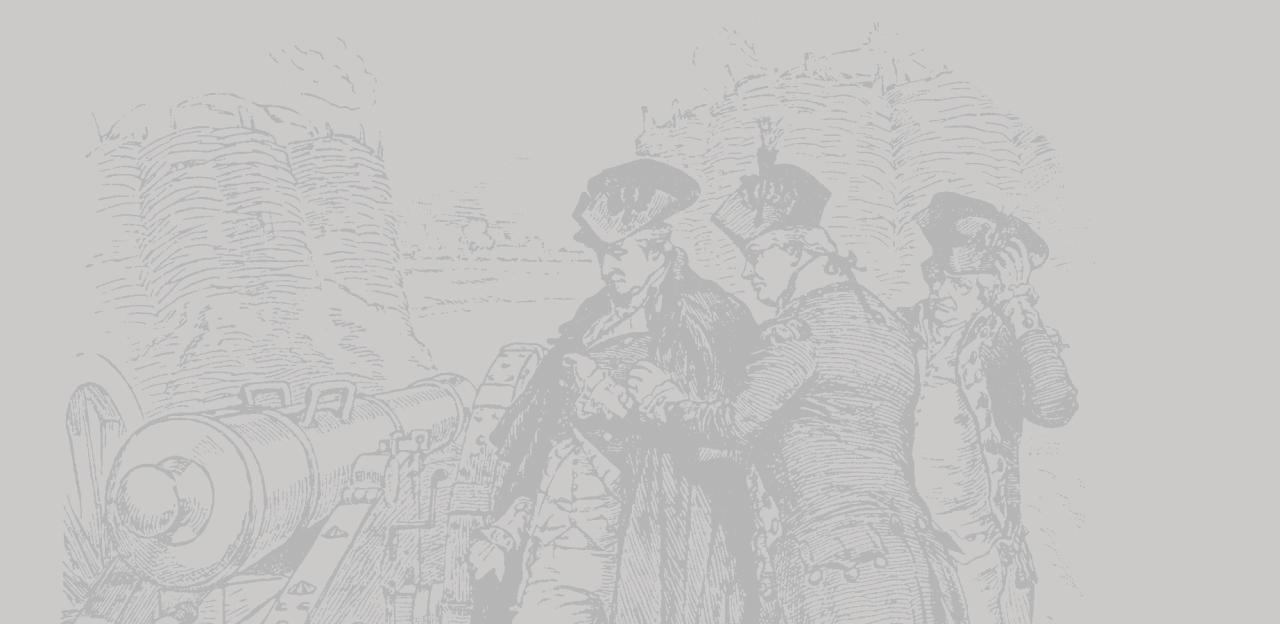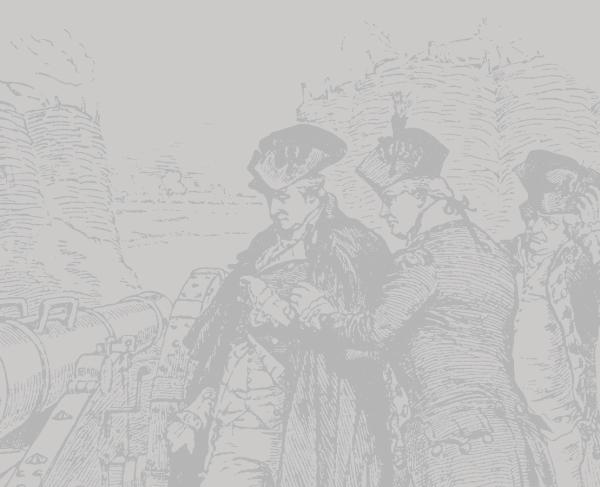Valley Forge: "Why are we sent here to starve and Freeze?"

Albigence Waldo served as a surgeon in the Continental Army. Born in 1750, he left his medical practice and family in Pomfret, Connecticut, and volunteered for the patriot cause. Waldo's diary is a valuable resource for studying the Continental Army's winter at Valley Forge (1777-1778), and he took care of sick soldiers in the camps. Waldo survived the Revolutionary War and returned to his home in Connecticut, continuing his medical career.
December 14 — Prisoners & Deserters are continually coming in. The Army which has been surprisingly healthy hitherto, now begins to grow sickly from the continued fatigues they have suffered this Campaign. Yet they still show a spirit of Alacrity & Contentment not to be expected from so young Troops. I am Sick — discontented — and out of humour. Poor food — hard lodging — Cold Weather — fatigue — Nasty Cloaths — nasty Cookery — Vomit half my time — smoak'd out of my senses — the Devil's in't — I can't Endure it — Why are we sent here to starve and Freeze — What sweet Felicities have I left at home; A charming Wife — pretty Children — Good Beds — good food — good Cookery — all agreeable — all harmonious. Here all Confusion — smoke & Cold — hunger & filthyness — A pox on my bad luck. There comes a bowl of beef soup — full of burnt leaves and dirt, sickish enough to make a Hector spue — away with it Boys — I'll live like the Chameleon upon Air. Poh! Poh! crys Patience within me — you talk like a fool. Your being sick Covers your mind with a Melanchollic Gloom, which makes every thing about you appear gloomy. See the poor Soldier, when in health — with what cheerfulness he meets his foes and encounters every hardship — if barefoot, he labours thro' the Mud & Cold with a Song in his mouth extolling War & Washington — if his food be bad, he eats it notwithstanding with seeming content — blesses God for a good Stomach and Whistles it into digestion. But harkee Patience, a moment — There comes a Soldier, his bare feet are seen thro' his worn out Shoes, his legs nearly naked from the tatter'd remains of an only pair of stockings, his Breeches not sufficient to cover his nakedness, his Shirt hanging in Strings, his hair dishevell'd, his face meagre; his whole appearance pictures a person forsaken & discouraged. He comes, and crys with an air of wretchedness & despair, I am Sick, my feet lame, my legs are sore, my body cover'd with this tormenting Itch — my Cloaths are worn out, my Constitution is broken, my former Activity is exhausted by fatigue, hunger & Cold, I fail fast I shall soon be no more ! and all the reward I shall get will be — "Poor Will is dead." People who live at home in Luxury and Ease, quietly possessing their habitations, Enjoying their Wives & families in peace, have but a very faint Idea of the unpleasing sensations, and continual Anxiety the Man endures who is in a Camp, and is the husband and parent of an agreeable family. These same People are willing we should suffer every thing for their Benefit & advantage, and yet are the first to Condemn us for not doing more!!
December 15. — Quiet. Eat Pessimmens, found myself better for their Lenient Opperation. Went to a house, poor & small, but good food within — eat too much from being so long Abstemious, thro' want of palatables. Mankind are never truly thankfull for the Benefits of life, until they have experienc'd the want of them. The Man who has seen misery knows best how to enjoy good. He who is always at ease & has enough of the Blessings of common life is an Impotent Judge of the feelings of the unfortunate. . . .
December 18. — Universal Thanksgiving — a Roasted pig at Night. God be thanked for my health which I have pretty well recovered. How much better should I feel, were I assured my family were in health. But the same good Being who graciously preserves me, is able to preserve them & bring me to the ardently wish'd for enjoyment of them again.
Rank & Precedence make a good deal of disturbance & confusion in the American Army. The Army are poorly supplied with Provision, occasioned it is said by the Neglect of the Commissary of Purchases. Much talk among Officers about discharges. Money has become of too little consequence. The Congress have not made their Commissions valuable Enough. Heaven avert the bad consequences of these things!! . . . .
December 21.—[Valley Forge.] Preparations made for hutts. Provisions Scarce. Mr. Ellis went homeward — sent a Letter to my Wife. Heartily wish myself at home, my Skin & eyes are almost spoil' d with continual smoke. A general cry thro' the Camp this Evening among the Soldiers, "No Meat! No Meat!" — the Distant vales Echo'd back the melancholly sound — "No Meat! No Meat!" Immitating the noise of Crows & Owls, also, made a part of the confused Musick.
What have you for your Dinners Boys? "Nothing but Fire Cake & Water, Sir." At night, "Gentlemen the Supper is ready." What is your Supper Lads? "Fire Cake & Water, Sir." Very poor beef has been drawn in our Camp the greater part of this season. . . .
December 22. — Lay excessive Cold & uncomfortable last Night — my eyes are started out from their Orbits like a Babbit's eyes, occasion'd by a great Cold & Smoke. What have you got for Breakfast, Lads ? " Fire Cake & Water, Sir." The Lord send that our Commissary of Purchases may live [on] Fire Cake & Water, 'till their glutted Gutts are turned to Pasteboard.
Our Division are under Marching Orders this morning. I am ashamed to say it, but I am tempted to steal Fowls if I could find them, or even a whole Hog, for I feel as if I could eat one. But the Impoverish'd Country about us, affords but little matter to employ a Thief, or keep a Clever Fellow in good humour. But why do I talk of hunger & hard usage, when so many in the World have not even fire Cake & Water to eat. . . .
December 26.— . . . . Many Country Gentlemen in the interior parts of the States who get wrong information of the Affairs & state of our Camp, are very much Surprized at Genl Washington's delay to drive off the Enemy, being falsely inform'd that his Army consists of double the Number of the Enemy's — such wrong information serves not to keep up the spirit of the People, as they must be by and by undeceiv'd to their no small disappointment ; — it brings blame on his Excellency, who is deserving of the greatest encomiums; it brings disgrace on the Continental Troops, who have never evidenced the least backwardness in doing their duty, but on the contrary, have cheerfully endur'd a long and very fatigueing Campaign. 'Tis true they have fought but little this Campaign; which is not owing to any Unwillingness in Officers or Soldiers, but for want of convenient Opportunities, which have not offer'd themselves this Season; tho' this may be contradicted by many; but Impartial Truth in future History will clear up these points, and reflect lasting honour on the Wisdom & prudence of Genl Washington. The greatest Number of Continental Troops that have been with his Excell. this Campaign, never consisted of more than Eleven thousand; and the greatest, Number of Militia in the field at Once were not more than 2000. Yet these accounts are exaggerated to 50 or 60,000. Howe, by the best, and most authentic Accounts has never had less than 10,000. If then, Genl Washington, by Opposing little more than an equal Number of young Troops, to Old Veterans has kept his Ground in general, Cooped them up in the City, prevented their making any considerable inroads upon him, Killed and wounded a very considerable number of them in different Skirmishes, and made many proselytes to the Shrine of Liberty by these little successes, and by the prudence, calmness, sedateness & wisdom with which he facilitates all his Opperations. This being the case, and his not having wantonly thrown away the lives of his Soldiers, but reserved them for another Campaign (if another should Open in the Spring) which is of the utmost consequence This then cannot be called an Inglorious Campaign. If he had risk'd a General Battle, and should have proved unsuccessfull, what in the name of Heaven would have been our case this Day. Troops are raised with great difficulty in the Southern States, many Regiments from these States do not consist of one hundred men. What then was the grand Southern Army before the N. England Troops joined them and if this Army is Cut off where should we get another as good. General Washington has doubtless considered these matters & his conduct this Campaign has certainly demonstrated his prudence & Wisdom. . . .
Source: Valley Forge, 1777-1778. Diary of Surgeon Albigence Waldo, of the Connecticut Line by Albigence Waldo. Published in 1897.

